News and Comment.
Page 9
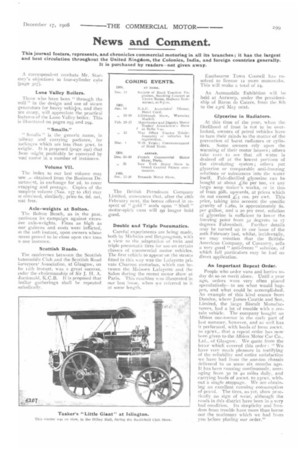
Page 10
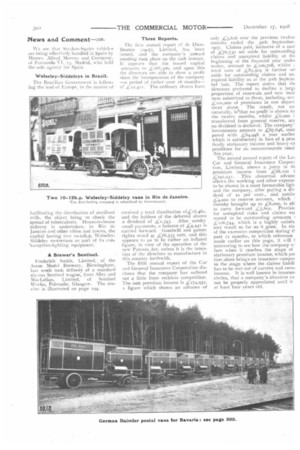
Page 11
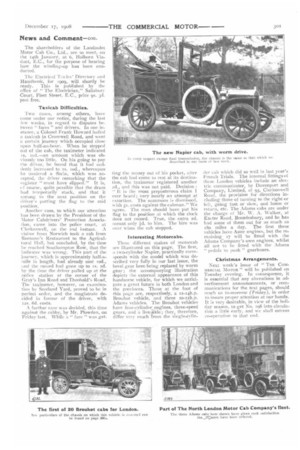
Page 12
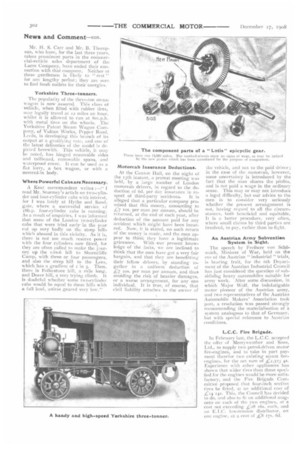
Page 13
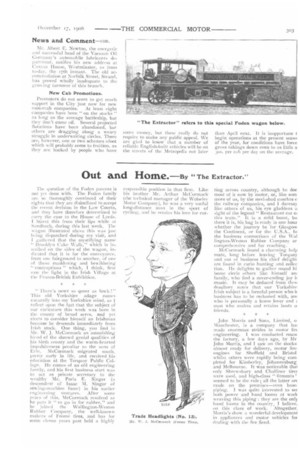
If you've noticed an error in this article please click here to report it so we can fix it.
Lune Valley Boilers.
Those who have been " through the mill " in the design and use of steam generators for heavy vehicles, and they are many, will appreciate the practical features of the Lune Valley boiler. This is illustrated OR pages 293 and 294.
Smalls" is the generic name, in ailway and carrying parlance, for Jairkitges which are less than 3cwt. in weight. It is proposed (page 292) that :hese might profitably be conveyed by -oad motor in a number of instances.
Volume VII.
The index to our last volume may
tow obtained from the Business De)artment, in exchange for 2d. to cover xrapping and postage. Copies of the iatriplete volume (Nos. 1.57 to 182) may ie obtained, similarly, price 6s. 6d. net, )ost free.
Axle-weights at Bolton.
The Bolton Bench, as in the past, 7ontinues its campaign against exces.,ive axle-weights. Fines as high as our guineas and costs were inflicted, in the loth instant, upon owners whose :xcess proved to be close upon two tons n one instance.
Scottish Roads.
The conference between the Scottish Wtomobile Club and the Scottish Road iurveyors' Association, at Glasgow, on he iith instant, was a great success., mder the chairmanship of Sir J. If. A. elacdonald, K.C.B. It is proposed that imilar gatherings shall be repeated oeriodically. The British Petroleum Company Limited, announces that, after the 28th February next, the bonus offered in respect of " gold " seals upon " Shell " motor-spirit cans will no longer •hold good.
Double and Triple Pneumatics.
Careful experiments are being made, both by Michelin and Bergougnan, with a view to the adaptation of twin and triple pneumatic tires for use on certain classes of commercial motor vehicles. The first l'alCit; to appear on the streets fitted in this way was the Lafayette private Charron motorbus, whirl; ran between the Maisons Lafayette and the Salon during the recent motor Show at Paris. This machine was illustrated in our last issue, when we referred to it at SOM 0 length,
Eastbourne Town Council has resolved to license 12 more motorcabs. This will make a total of 24, An Automobile Exhibition will be held at Antwerp, under the presidentship of Baron de Caters, from the 8th to the 23rd May next.
Glycerine in Radiators.
At this time of the year, when the likelihood of frost is not to be overlooked, owners of petrol vehicles have to turn their minds to the matter of the prevention of burst radiators or cylinders. Some owners rely upon the warming of their motor houses; others take care to see that all water is drained off at the lowest portions of the circulating system; others put glycerine or comparable anti-freezing solutions or substances into the water itself. Pale-distilled glycerine can be bought at about ,4-,'6o per ton, e.x any large soap maker's works, or in tins of from 561b. upwards, at prices which do not exceedL,..3 los. per cwt. This price, taking into account the specific gravity of I.260, is approximately 8s. per gallon, and a 20 per cent. solution of glycerine is sufficient to lower the freezing point from 32 degrees to 17 degrees Fahrenheit. Further details may be turned up in our issue of the 20th February last, whilst, incidentally, we may mention that the BritishAmerican Company, of Coventry, sells a very good " anti-freeze " solution, of which full particulars may be had on direct application.
An Important Repeat Order.
People who order vans and lorries tcday do so on merit alone. Until a year ago, orders were very often placed speculatively—to see what would happen, and what could be accomplished. An example of this kind comes from Dundee, where James Couttie and Son, Limited, the large Biscuit Manufacturers, had a lot of trouble with a certain vehicle. The company bought an Albion one-tonner in the early part of last summer, however, and so well has it performed, with loads of from 2oewt. to 25cwt., that a repeat order has now been given to the Albion Motor Car Co., Ltd., of Glasgow. We quote from the letter which covered this order : " We have very much pleasure in testifying of the reliability and entire satisfaction we have had from the one-ton chassis. delivered to us some six months ago. It has been running continuously, averaging from 3o to 40 miles daily, and carrying loads of 20cwt. to 25cwf. with.. out a single stoppage. We are obtaining an excellent running consumption of petrol. The tires, as yet, show practically no sign of wear, although the roads in this district have been in a very had condition. Its simplicity and freedom from trouble have more than borne out the testimony which we had from you before placing our order." We see that Straker-Squire vehicles .are being effectively handled in Spain by Messrs. Alfred Moreno and Company, of Fernando VI, 23, Madrid, who hold the sole agency for Spain WoIseley-Siddeleys in Brazil.
The Brazilian Government is following the lead of Europe, in the matter of
facilitating the distribution of sterilised milk, the object being to check the spread of tuberculosis. House-to-house delivery is undertaken, in Rio de Janeiro and other cities and towns, the capital having two lo-12h.p. WolseleySiddelev motorvans as part of its con'surnption-lighting equipment.
A Brewer's Sentinel.
Frederick Smith, Limited, of the Aston Model Brewery, Birmingham, last week took delivery of a standard six-ion Sentinel wagon, from Alley and MacLellan, Limited, of Sentinel Works, Polmadie, Glasgow. The ma.cine is illustrated on page 294.
The first annual report of de DionBouton t 1907), Limited, has been issued, and the company's annual meeting took place on the loth instant. it appears that the issued capital amounts to L16S,306, and upon this the directors are able to show a profit since the incorporation of the company —a period of rather over 18 months— of .4.22,411. The ordinary shares have
received a total distribution of-‘;16,46r, and the holders of the deferred shares a dividend of L1,343. After sundry small payments, a balance of ..4,441 is carried forward. Goodwill and patent rights stand a,f. £76,533 nett, and this appears to us to be rather an inflated figure, in view of the operation of the new Patents Act, unless it is the intention of the directors to manufacture in this country forthwith.
The fifth annual report of the Car and General Insurance Corporation discloses that the company has suffered not a little from reckless competition. The nett premium income is L:174,952, it figure which shows an advance of only j.;3,616 over the previous twelvemonths ended the 3oth September, 1907. Claims paid, inclusive of a sum of -<76,730 set aside for outstanding claims and unexpired liability at tilt beginning of the financial year untie: notice, amount to £106,708, whilst z total sum of £82,504 is further sei aside for outstanding claims and un.
expired liability as at the 3oth Septetn. bet last. The report 'states that thE
directors preferred to decline a largc proportion of renewals and new busi ness submitted to them, including ove: £100,000 of premiums in one depart. naent alone. The result, not un. naturally, iethat no profit is shown fol the twelve months, whilst L.6,000 transferred from general reserve, an no dividend is declared. The company': investments amount to £67,648, corn pared with £64,948 a year earlier which is satisfactory in face of a prac tically stationary income and heavy ex penchture for no commensurate rosul this year. The second annual report of the La‘ Car and General Insurance Corpora don, Limited, shows a jump in th premium income from .4:68, too t £191,93t. This abnormal advanc allows the working and other expensc to be shown in a most favourable ligh. and the company, after paying a div dend of to per cent., and puttin -4:4,000 to reserve account, which i thereby brought up to ,8,000, is abl to carry forward £3,602. Provisic for unexpired risks and claims est mated to be outstanding amounts 1 L'106,744, which is a highly satisfa tory result so far as it goes. In vie of the excessive competition during ti past 12 months, to which reference made earlier on this page, it will I interesting to see how the company wi fare when it reaches the stage of stationary premium income, which pot tion alone brings an insurance compar to the stage where the claims liabili.
has to be met out of current and earn( income. It is well known in insurara circles, that a company's situation Ca: not be properly appreciated until it at least four years old.
The shareholders of the Landaulet Motor Cab Co., Ltd., are to meet, on the 14th January, at 6, Helborn Viaduct, E.C., for the purpose of hearing how the winding-up has been conducted.
The Electrical Trades' Directory and Handbook, for Igoe, will shortly be ready. This is published by the office of " The Electrician," Salisbury Court, Fleet Street, E.C., price 95. 3d. post free.
Taxicab Difficulties.
Two cases, among others, have come under our notice, during the last few weeks, in regard to disputes between " fares " and drivers. In one instance, a Colonel Frank Howard hailed a taxicab in Cromwell Road, and went a certain journey which occupied close upon half-an-hour. When he stepped out of the cab, the taximeter indicated
tod.—an amount which was obviously too little. On his going to pay the driver, he found that it had suddenly increased to 2s. iod., whereupon he tendered a florin, which was accepted, the driver remarking that the register " must have slipped." It is, cf course, quite possible that the drum bad temporarily stuck, and that it sprung to the next position on the driver's putting the flag to the mid position.
Another case, to which our attention has been drawn by the President of the Motor Cabdrivers' Protection Association, came into the police court, at Clerkenwell, on the 2nd instant. A visitor from Norwich took a cab from Romano's Restaurant to the Agricultural Hall, but concluded, by the time he reached Southampton Row, that the indicator was wrong. This part of the journey, which is approximately half-amile in length, had already cost tad., and the record had gone up to is. 2d. by the time the driver pulled up at the police station at the corner of the Gray's Inn Road and Theobald's Road, The taximeter, however, on examination by Scotland Yard, proved to be in perfect order, and the magistrate decided in favour of the driver, with 12S. 6d. costs.
A further case was decided, this time against the cabby, by Mr. Plowden, on Friday last. While a " fare " was get ting the money out of his pocket, after the cab had come to rest at its destination, the taximeter registered another 2d., and this was not paid. Decision : "it is the most preposterous claim I ever heard ; very nearly an attempt at extortion. The summons is dismissed, with 5s. costs against the cabman." We agree. The man should have put his flag to the position at which the clock does not record. True, the extra 2d. meant only id. to him. The hire was over when the cab stopped.
Interesting Motorcabs.
Three different makes of motorcab are illustrated on this page. The first, a two-cylinder Napier, practically corresponds with the model which was described very fully in our last issue, the bevel gear here being replaced by worm gear; the accompanying illustration depicts the external appearance of this handsome vehicle, for which we anticipate a great future in both London and the provinces. Those at the foot of this page are, respectively, a 12-14b.p. Brouhot vehicle, and three to-tzh.p. Adams vehicles. The Brouhot vehicles have four-cylinder, engines, three-speed gears, and a live Axle; they, therefore, differ very much from the single-cylin tier cab which did so well in last year's French Trials. The internal fittings of these London vehicles include an electric communicator, by Davenport and Company, Limited, of 95, Clerkenwell Road, the provision for directions including those of turning to the right or left, going fast or slow, and home or return, etc. The Adams cabs are under the charge of Mr. W. A. Walker, at Exeter Road, Brondesbury, and he has had some of them out for as much as TS° miles a day. The first three vehicles have Aster engines, but the remaining 17 will be fitted with the Adams Company's own engines, whilst all are to be fitted with the Adams " pedals to push " gearboxes.
Christmas Arrangements.
Next week's issue of " THE COMMERCIAL MOTOR" will be published on Tuesday evening. In consequence, it is essential that any alterations in advertisement announcements, or communications for the text pages, should reach us to-morrow (Friday), in order to insure proper attention at our hands. It is very desirable, in view of the holiday season, to get No. 198 into circuladon a little early, and we shall esteem co-operation to that end. Mr. H. S. Carr and Mr. B. Thompson, who have, for the last three years, taken prominent parts in the commercial-vehicle sales department of the Lacre Company, have ended their connection with that company. Neither of these gentlemen is likely to " rest " for any lengthy period; they are sure to find fresh outlets for their energies.
Yorkshire Three-tonners.
The popularity of the three-ton steam wagon is now assured. This class ot vehicle, when fitted with rubber tires, may legally travel at 12 miles an hour, whilst it is allowed to run at 8m.p.h. with metal tires on the wheels. The Yorkshire Patent Steam Wagon Company, of Vulcan Works, Pepper Road, Leeds, is developing this branch of its output at a gratifying rate, and one of the latest deliveries of the model is depicted herewith. This vehicle, it may be noted, has hinged removable sides and tailboard, removable spans, and waterproof cover. It can be used as a flat lorry, a box wagon, or with a covered-in body.
Where Powerful Cabs are Necessary.
A Kent correspondent writes :—" read Mr. Sturmey's article on two-cylinder and four-cylinder cabs with interest, for I was lately at Hythe and Sandgate, where a successful service of ISh.p. four-cylinder cabs is running. As a result of enquiries, I was informed that some of the London two-cylinder cabs that were tried early • in the year cut up very badly on the steep hills which abound in this vicinity. As it is, there is not too much reserve power with the four cylinders now fitted, for they are often called to make the journey up the r-in-6 hill to Shorncliffe Camp, with three or four passengers, and also the steep hill to the Lees, which has a gradient of i in 5. Then, there is Folkestone hill, a mile long, and Dover hill, a very trying climb. It is doubtful whether some two-cylinder cabs would be equal to these hills with a full load, unless geared very low." Atotorcab Insurance Deductions.
At the Caxton Hall, on the night of the e3th instant, a protest meeting was held, by a large number of London rnotoreab drivers, in regard to the deduction of od. per day insurance in re spect of third-party accidents. It is alleged that a particular company promised that this money, amounting to mos. per man per annum, should be returned, at the end of each year, after deduction of the amount paid for any accident which might have been incurred. Now, it is stated, no such return of the money is made, and the men appear to think they have a legitimate
grievance. ‘Vith • our present knowledge of the fats, we are inclined to think that the men have got a very fair bargain, and that they are benefitting their fellow drivers, by standing together in a uniform deduction of 4'7 los. per man per annum, and thus avoiding the risk of heavier damages, or a worse arrangement, for any one individual. It is true, of course, that civil liability attaches to the owner of
the vehicle, and not to the paid driver; in the case of the tnotorcab, however, some uncertainty is introduced by the fact that the man shares the profits, and is not paid a wage in the ordinary sense. This may or may not introduce a legal difficulty, but our advice to the men is to consider very seriously whether the present arrangement is not, having regard to all the circumstances, both beneficial and equitable. It is a better procedure, very often, where small claims by third parties are Involved, to pay, rather than to fight.
An Austrian Army Subvention System in Sight.
The speech by Freiherr von Sell& naich, Minister of War, held on the eve of the Austrian " industrial " trials, is bearing fruit, for the 6th Department of the Austrian Industrial Council has just considered the question of subsidising heavy automobiles suitable for army work. After some discussion, in which Major Wolf, the indefatigable motor pioneer of the Austrian army, and two representatives of the Austrian Automobile Makers' Association took part, a resolution was passed strongly recommending, the materialisation of a system analogous to that of Germany. but with special reference to Austrian conditions.
L.C.C, Fire Brigade.
In February last, the L.C.C. accepted the offer of Merryweather and Sons, Ltd., to supply two petrol-driven motor fire-engines, and to take in part payment therefor two existing steam fireengines, for the net sum of L:2,323 4s. Experience with other appliances has shown that wider tires than those specified for the engines would be more satisfactory, and the Fire Brigade Committee proposed that four-inch section tires be fitted, at an additional cost of L:14 r4s. This, the Council has decided to do, and also to lit an additional magneto on each of the two engines, at a cost not exceeding 4;28 16s. each, and an E.I.C. low-tension distributor, on
one engine, at a cost of 17s. 6d.
Mr. Albert E. Newton, the energetic and successful head of the Vacuum Oil Company's automobile lubricants department, notifies his new address at Caxton House, Westminster, as from to-day, the 17th instant. The old accommodation at Norfolk Street, Strand, has proved wholly inadequate to the growing turnover of this branch.
New Cab Promotions.
Promoters do not seem to get much support in the City just now for new motorcab companies. At least eight companies have been " on the stocks " as long as the average battleship, but they don't come off. Several projected flotations have been abandoned, but others are dragging along a weary struggle in underwriting circles. There are, however, one or two schemes afoot which will probably come to fruition, as they are backed by people who have some money, but these really do not require to make any public appeal. We are glad to know that a number of reliable English-built vehicles will be on the streets of the Metropolis not later than April next. It is inopportune t begin operations at the present seaso of the year, for conditions have force gross takings down even to as little a 30s. per cab per day on the average.






















